Presentations
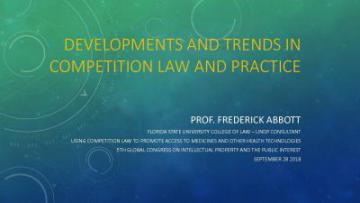
Developments and Trends in Competition Law and Practice
Presentation by Frederick Abbott
Using Competition Law to Promote Access to Medicines and Other Health Technologies
5th Global Congress on Intellectual Property and the Public Interest
Audio file belowGIES
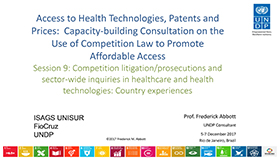
ISAGS-UNISUR / Fiocruz / UNDP Consultation on Competition and Access to Health Technologies
Presentations by Frederick M. Abbott at:
Access to Health Technologies, Patents and Prices:
Capacity Strengthening Consultation on the Use of Competition Law to
Promote Affordable Access
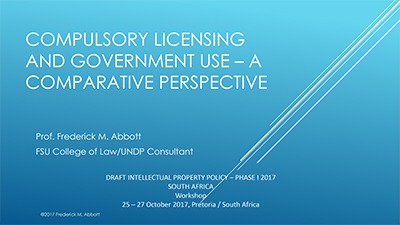
DTI South Africa - Workshop on Draft Intellectual Property Policy
The Department of Trade and Industry (the dti) of the Republic of South Africa, the United Nations Conference on Trade and Development (UNCTAD), and the United Nations Development Programme (UNDP) organized a three-day workshop on the dti draft National intellectual property (IP) policy – Phase I 2017 (Draft Policy) in Pretoria, South Africa, from 25-27 October 2017. The objective of the workshop was to discuss the Draft Policy with stakeholders.
Three presentations by Frederick M. Abbott
A Never-ending Tale: IP governance, the (captured) regulatory state and the world of second bests
Presentation by Frederick Abbott at
The Global Debate on Intellectual Property, Trade and Development: Past, Present and Future
A Conference in Honour of Pedro Roffe
Session One: Intellectual Property Governance and the Rise of the Regulatory State: Intersections with Trade, Investment, Health and Development
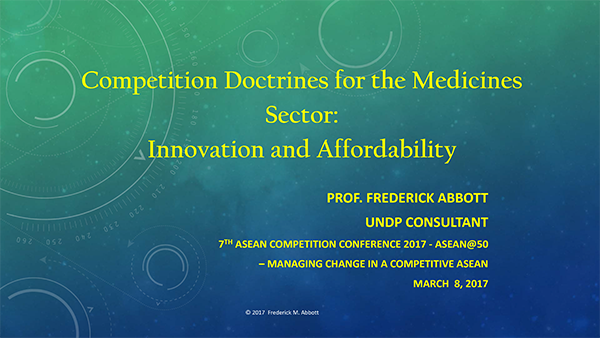
Competition Doctrines for the Medicines Sector: Innovation and Affordability
Presentation by Frederick Abbott at
7th ASEAN Competition Conference 2017 - ASEAN@50
– Managing Change in a Competitive ASEAN
PowerPoint and Audio (presentation/Q&A) below
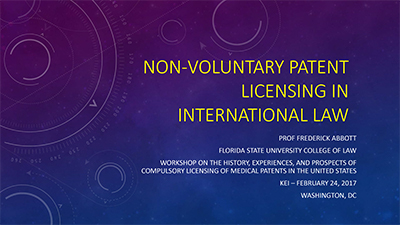
Non-Voluntary Patent Licensing in International Law
Presentation at:
Workshop on the History, Experiences, and Prospects of Compulsory Licensing of Medical Patents in the United States
Kaiser Permanente Center for Total Health
The WTO and Intellectual Property in the Midst of Tectonic Shift
Presentation by Prof. Frederick Abbott at WTO@20 Conference, New Delhi
Organized by the Appellate Body of the World Trade Organization
together with National Law University, Delhi
Audio Recording
Lecture on Trade Implications of Trump Election
This is an audio recording of Prof. Abbott's November 9, 2016 lecture on the potential trade and economic implications of the election of Donald Trump as the next President of the United States, with his class on International Trade and Investment Law at Florida State University College of Law.
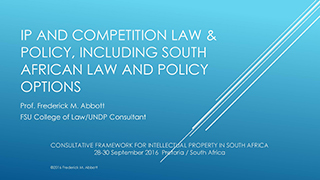
South Africa DTI Consultative Framework
The Department of Trade and Industry (the dti) of the Republic of South Africa, the United Nations Conference on Trade and Development (UNCTAD), and the United Nations Development Programme (UNDP) three-day workshop on the dti intellectual property (IP) consultative framework, in Pretoria, South Africa, from 28-30 September, 2016. The objective of the workshop was to obtain inputs from stakeholders on the framework, which forms the basis for the development of the national IP policy.
Four presentations by Frederick M. Abbott
PowerPoints
TRIPS plus provisions in plurilateral/regional trade agreements and their impact on access to medicines at the national and global level
Presentation by Frederick Abbott
and following remarks by Director General Margaret Chan
Official BRICS Side-event
Access to Medicines and Trade Agreements
69th World Health Assembly
